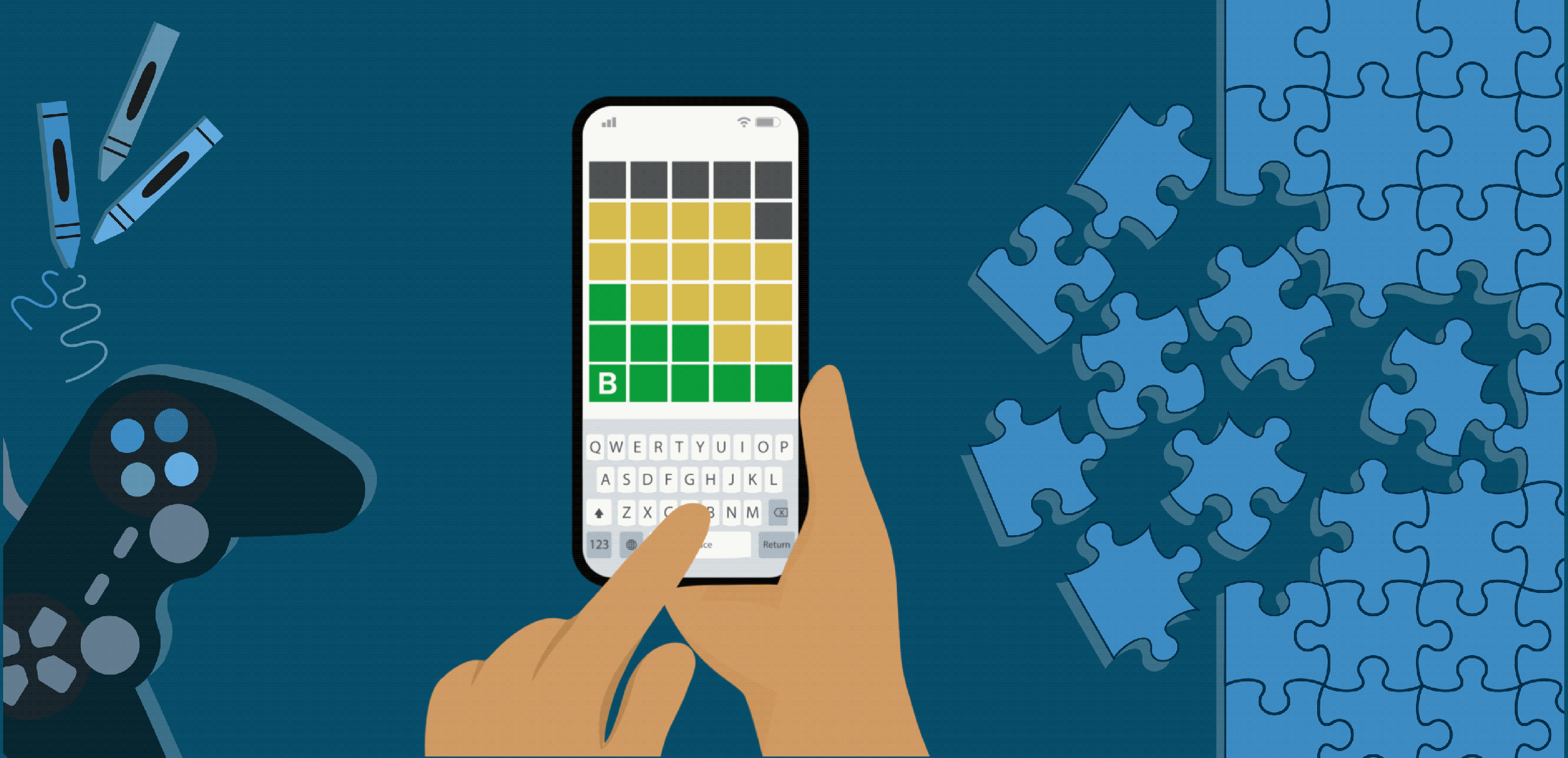
Illustration by Liz Zonarich/Harvard Staff
Should kids play Wordle?
Early childhood development expert has news for parents who think the popular online game will turn their children into super readers
Part of the Wondering series
A series of random questions answered by Harvard experts.
Millions of people play Wordle, the popular online game in which players must guess a five-letter word in six tries. We asked researcher Nadine Gaab, associate professor of education at the Harvard Graduate School of Education, about the game’s possible benefits on young people’s brains. Gaab’s work is at the intersection of developmental psychology, learning sciences, and cognitive neuroscience.
People wonder if Wordle makes young people or adults smarter, but I don’t think playing the game has much to do with your general cognitive abilities. If you’re good at it, it may be because of your reading abilities, spelling abilities, recognizing spelling patterns, and memorizing word combinations. But what I can tell you is pure speculation because to my knowledge no one has looked at this. There are many literacy games such as Scrabble, crossword puzzles, and so on, that can be beneficial for both children and adults in general. For young children, it’s good to engage them with letters and letter combinations, or anything that’s related to reading, the earlier the better.
“For young children, it’s good to engage them with letters and letter combinations, or anything that’s related to reading, the earlier the better.”
I have three young children, and at least one of them is really into Wordle. I play it, too. People like it because it’s satisfying and gives you fast feedback. If you’re drawn to play these kinds of games and you have fun doing it, it’s fine as long as you’re not spending hours a day doing it and neglecting other aspects of your life. Overall, educational games are a good way of engaging a child’s attention and having positive emotions while adding educational value. Any extracurricular engagement — sports, recreational games, chess, reading books, etc. — has been shown to be beneficial for the overall development of a child. There have been studies looking at the impact of martial arts, chess, or physical activity on kids, and the research didn’t find that one activity is better than others. If a child is positively engaged, and the activity has a social component and evokes positive emotions, it’s a good thing.
In general, the brain gets activated from playing all types of games. It all depends on the nature of the game more than whether it’s online or on a board. When we play Wordle, we can speculate that at least the four key areas in the brain that are involved in reading get activated. All these areas are in the brain’s left hemisphere; one is the visual word form area, which French scholar Stanislas Dehaene calls the brain’s letterbox. This area, located in the back part of the brain in the left hemisphere, is probably engaged when people are playing Wordle because you see letters and you recognize words. Other areas that get activated are the oral language areas and the higher order areas of the brain (especially the inferior frontal lobe) often nicknamed the CEO of the reading brain, which helps with integrating everything into a bigger picture by making sense of things you read or hear. I would hypothesize that probably all these areas are somewhat involved in playing Wordle, but to be honest, I don’t think that this will be much different from any other letter game, or any other letter activity kids do in a kindergarten classroom or second-grade classroom. Those activities have reading, oral language, and memory components, and they also have what we call orthographic mapping because if you’re guessing words, you must retrieve words that fit a combination. People who are good spellers and have both good orthographic mapping and spelling abilities are probably better at the game than people whose skills are not as pronounced as others.
I would say that playing Wordle or any word game is good, but it doesn’t mean that if you play word games at home and you read every day that will automatically lead [your child] to be a superior reader or prevent reading disabilities. Learning to read requires several skills and develops over a very long period. A study we did in my lab shows that brain areas foundational for both language and reading development start developing as early as in utero. The quality of early education also plays a role. Wordle can be one of many of activities you play with your kids, but parents shouldn’t think it’s going to turn their kids into superior readers. My recommendation is to read to your child every day and start playing fun letter games early on. Our lab did several studies showing that home literacy is correlated with brain development, especially for the reading-related areas.
We often forget the mental health component of early childhood. It’s good to remember that if a child is happy and engaged in doing something that has educational value, the best thing is to let them do what they’re doing. If every morning you pull your child away from their wonderful outside play or whatever activity they’re engaged in, and say, “We have to do the word of the day because it’s good for your brain development or your reading development,” that is a mistake. Games are beneficial, especially if kids don’t see them as a chore.
— As told to Liz Mineo, Harvard Staff Writer





